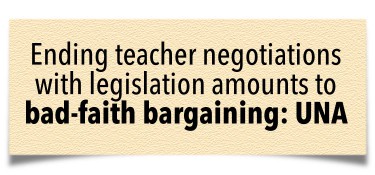Ending teacher negotiations with legislation amounts to bad-faith bargaining: UNA
All Albertans should be gravely concerned by the Redford Government’s plan to impose a legislatively mandated contract settlement on school boards and teachers throughout the province.
United Nurses of Alberta Secretary-Treasurer Karen Craik said the legislation announced yesterday by Education Minister Jeff Johnson undermines the entire collective bargaining process, a system that has worked well and continues to work well for Alberta.
“Trying to reach the result you want through collective bargaining, then resorting to public pressure and finally using legislation when you can’t get your way is really nothing more than bargaining in bad faith,” Craik said.
What is particularly troubling, she added, is that there was no legislative, regulatory or practical need for a single province-wide collective agreement to cover the province’s 62 school boards and the 40,000 teachers represented by the Alberta Teachers Association.
School boards were given an arbitrary deadline yesterday afternoon to ratify the deal. When there was a holdout – the Calgary Board of Education, the province’s largest school board – Johnson announced the government would impose it through legislation. One other board has not yet voted on the deal.
“The deadline set by the minister and the notion the deal would fail if there were a few holdouts is not factually correct,” Craik said. “The government’s agenda seems to be driven by politics, not sound labour relations practice.”
Until recently, it was virtually unheard of for governments to impose settlements on ongoing contract negotiations without attempting to reach an agreement through processes such as mediation and arbitration, Craik said.
“This development, which we have also seen recently from the federal government, appears to be designed to undermine the entire collective bargaining process throughout the public sector,” she said.
“As a union currently involved with Alberta Health Services, UNA is very concerned about the bad-faith implications of this tactic by the government,” Craik said.
“This is extremely disappointing from a government that indicated it was committed to public services and valued its public employees,” she added.
In professions like nursing where there is an international shortage of skilled practitioners, this kind of tactic will make health care employers’ problems with recruiting and retaining skilled employees much worse, she predicted.
30

